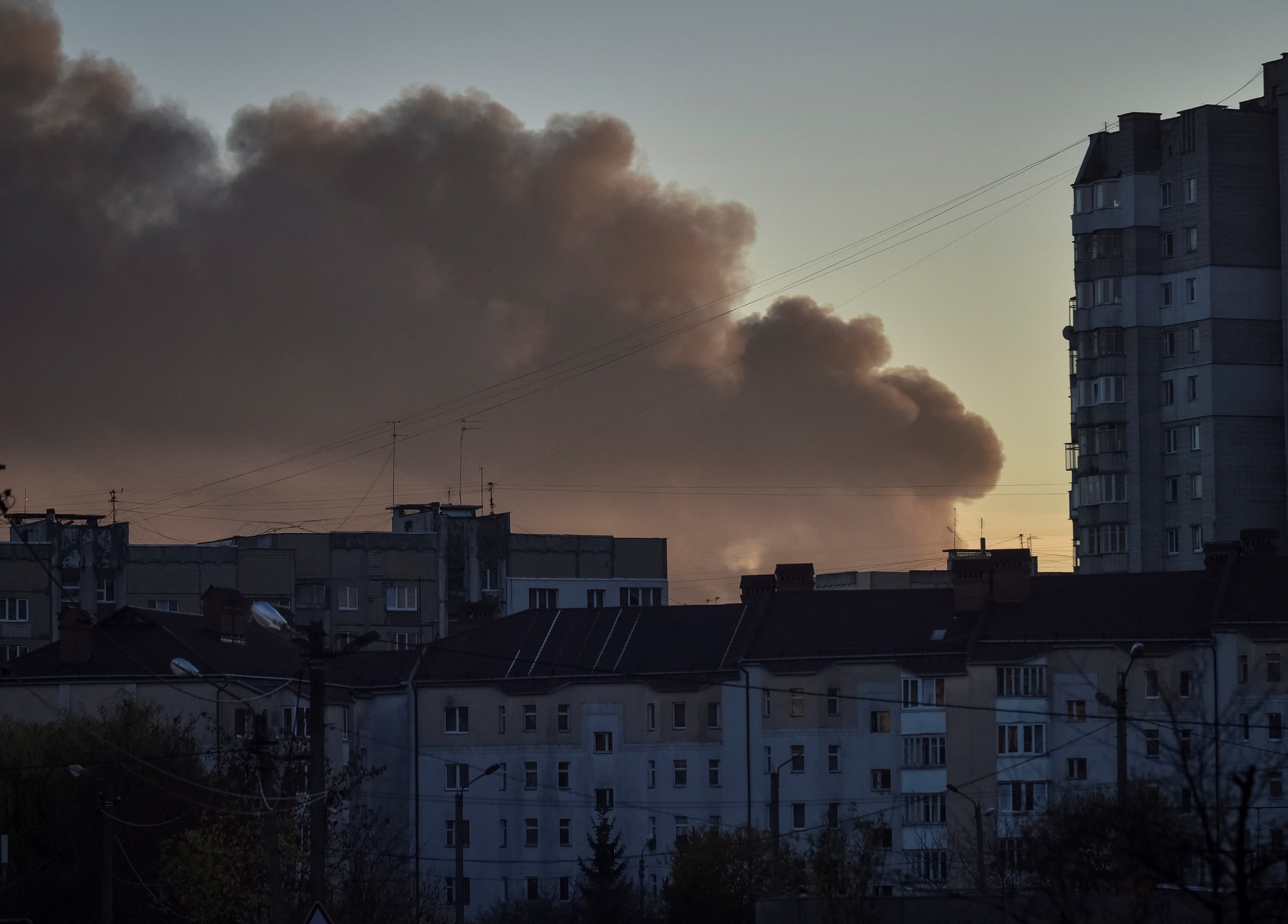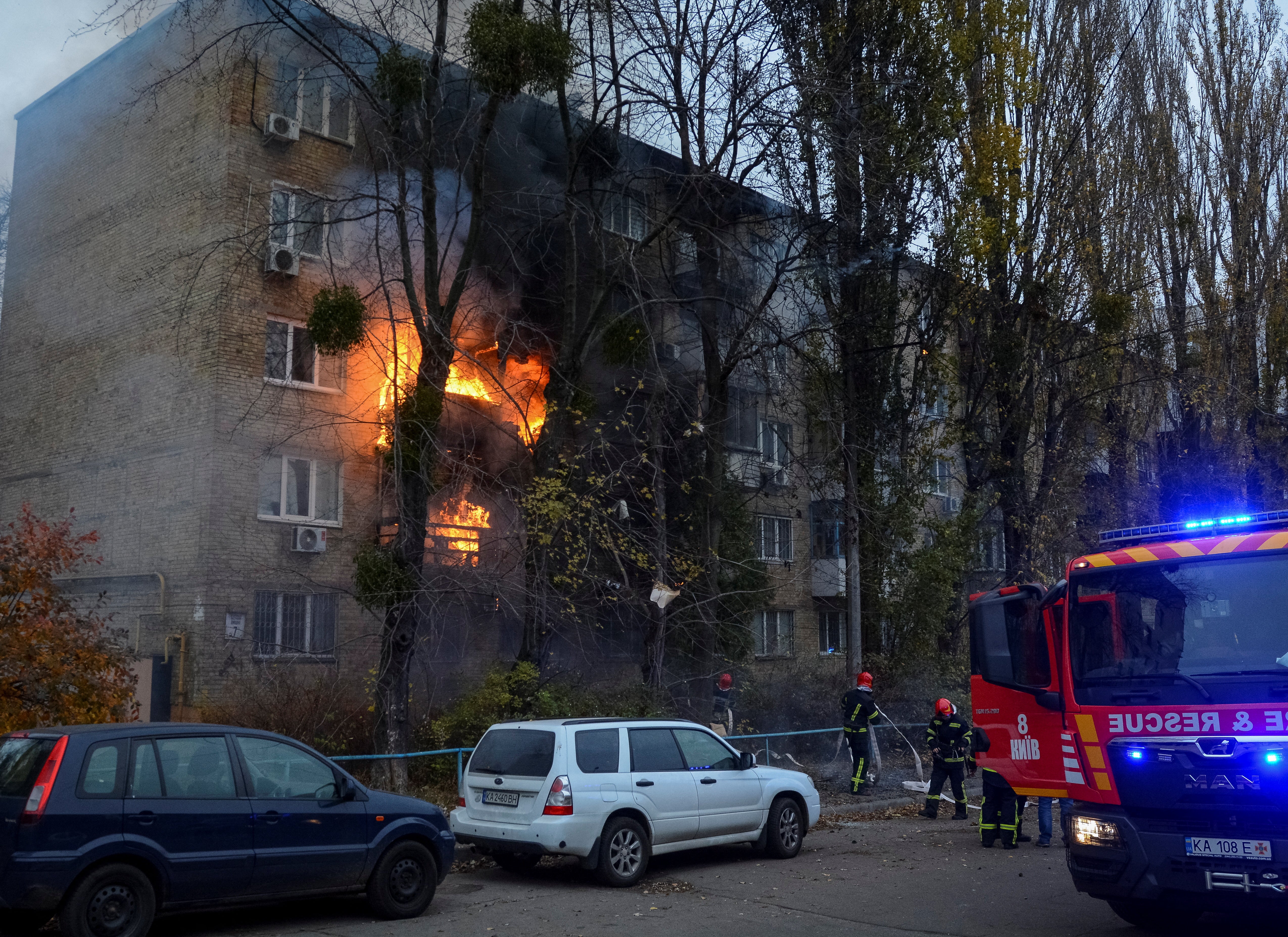‘We will survive,’ says Zelensky despite huge power cuts after Russia fires 100 missiles on Ukraine
Extraordinary wave of strikes reported hours after Zelensky addresses leaders at G20
Your support helps us to tell the story
From reproductive rights to climate change to Big Tech, The Independent is on the ground when the story is developing. Whether it's investigating the financials of Elon Musk's pro-Trump PAC or producing our latest documentary, 'The A Word', which shines a light on the American women fighting for reproductive rights, we know how important it is to parse out the facts from the messaging.
At such a critical moment in US history, we need reporters on the ground. Your donation allows us to keep sending journalists to speak to both sides of the story.
The Independent is trusted by Americans across the entire political spectrum. And unlike many other quality news outlets, we choose not to lock Americans out of our reporting and analysis with paywalls. We believe quality journalism should be available to everyone, paid for by those who can afford it.
Your support makes all the difference.A defiant Volodymyr Zelensky said his country “will survive” after Russia fired some 100 missiles on Ukraine on Tuesday, causing widespread power outages across the country, leaving the capital Kyiv without electricity and leaving at least one person dead.
Russian missiles rained down on Ukraine, striking in several other cities including Lviv and Zhytomyr in the west, Kryvyi Rih in the south and Kharkiv in the east. Several residential areas were reportedly hit. There were also claims the missiles had caused power cuts in neighbouring Moldova.
Air raid sirens blared and explosions rang out in nearly a dozen major cities, in what Ukraine said was the heaviest wave of missile strikes in nearly nine months of war.
A Ukrainian air force spokesman said Russia fired around 100 missiles, while the Ukrainian leader put the number at 85 but warned more could follow.
President Zelensky said: “I know that the strikes turned off energy in many places… We are working, we will restore everything, we will survive.”
The barrage came just days after Russian troops retreated from the key southern city of Kherson and followed a pattern in recent weeks of Moscow lashing out far from the front after battlefield losses.
In the capital Kyiv, flames funnelled out of a five-storey apartment block, one of two residential buildings the authorities said had been hit there. The mayor said one person was confirmed killed and half the capital left without power. Residents were urged to stay indoors.
“The danger has not passed,” said Kyrylo Tymoshenko, the deputy head of President Zelensky’s office, as the country’s grid operator Ukrenergo said emergency outages were being enforced in response to attacks.
Other strikes or explosions were reported in cities ranging from Lviv and Zhytomyr in the west to Kryvy Rih in the south and Kharkiv in the east. Regional officials reported some of the attacks had knocked out electricity supplies.
The mayor of Lviv said power was down in the city and the mayor of Kharkiv, Ihor Terekhov, said critical infrastructure facilities had been damaged.

Hours earlier, the Ukrainian president had called on world leaders at the G20 summit in Indonesia to help bring an end to Vladimir Putin’s invasion.
The widespread attacks came just four days after Russian troops abandoned Kherson, the only regional capital Moscow had captured since its invasion, and only six weeks after President Putin declared it an eternal part of Russia.
Russia had said last week its troops would occupy positions that were easier to defend on the opposite bank of the Dnipro River. But video images filmed in the town of Oleshky, across a collapsed bridge from Kherson, appeared to show Russian forces had abandoned their bunkers there too.
Further east, Russian-installed administrators said they were pulling civil servants out of the region’s second biggest city, Nova Kakhovka, located on the river bank next to a huge, strategic dam.
Natalya Humenyuk, a Ukrainian military spokesperson, said Moscow appeared to be repositioning troops and artillery 15-20 km (10-12 miles) further from the Dnipro, to protect its guns from Ukrainian counterstrikes.
Russia had artillery still capable of striking Kherson from those new positions, but “we also have something to answer with”, she said.
Just 24 hours earlier, President Zelensky had toured the recaptured city being greeted by jubilant residents.
The war was a focus of the G20 summit, where Western leaders denounced Moscow.
Western countries sought a summit declaration that would condemn the war despite Russian opposition and a lack of unanimity.
Diplomats circulated a 16-page draft that said: “Most members strongly condemned the war in Ukraine and stressed it is causing immense human suffering and exacerbating existing fragilities in the global economy.”
France’s president Emmanuel Macron also called China to cooperate more closely to help end the war. China is seen as a key Russian ally for the conflict, but in September it emerged that Beijing had “questions and concerns” about the conflict.

However, a Chinese summary of the talks with Mr Macron made no mention of Ukraine until the final paragraph.
The Kremlin’s foreign minister Sergey Lavrov, head of Russia’s delegation in Mr Putin’s absence, accused the West of trying to politicise the declaration.
Also on Tuesday, the United Nations Commission on Human Rights (UNCHR) found that both Russia and Ukraine have tortured prisoners of war.
The Ukraine-based monitoring team based its findings on interviews with more than 100 prisoners of war on each side of the conflict.

Join our commenting forum
Join thought-provoking conversations, follow other Independent readers and see their replies
Comments